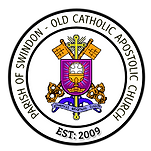.png)


Welcome to The Old Catholic Apostolic Church the Parish of Swindon! Our vibrant parish is a joyful family within the larger community of the Church, rooted in the inspiring legacy of the Old Catholics of Utrecht.
With a passionate commitment to preserving the ancient undivided Catholic faith, we are dedicated to safeguarding the authentic worship and teachings that define our beloved Old Catholic Church.
In these challenging times, we strive to be a beacon of spiritual peace, inviting everyone to join us as live out our faith with devotion, hope, and charity, following Christ’s example.
Together, let’s celebrate our rich spiritual heritage, embracing the unity and diversity that connects us with saints and faithful throughout history. We warmly invite you to join us in nurturing this sacred tradition and growing in grace!

Peace and blessings to you!
I am grateful that you have taken a moment to visit our parish website.
Rev Mark Paris Haines